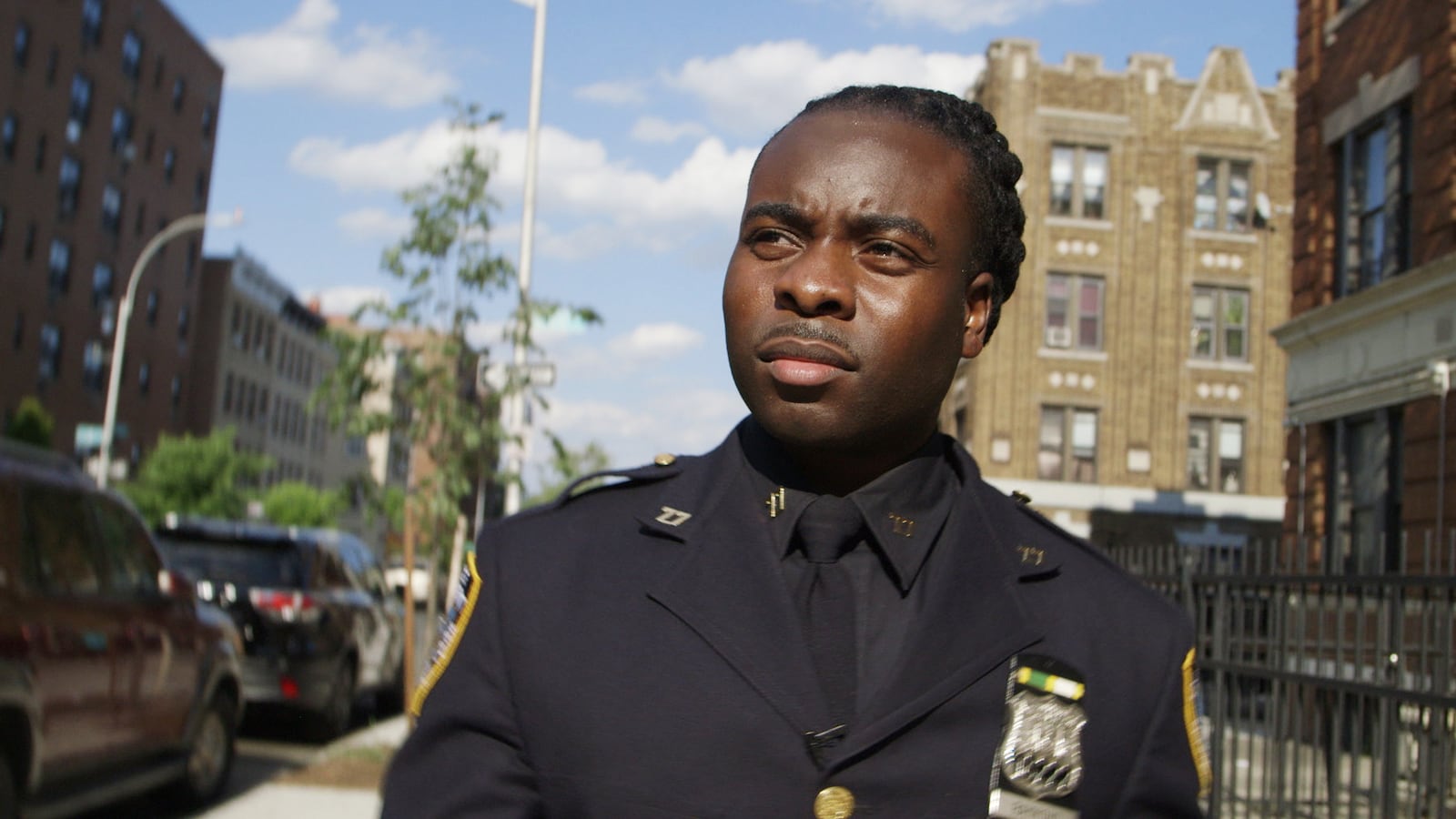Since 2010, police quotas for arrests and summonses have been illegal in New York. And yet, recent years have seen a series of rank and file cops—mostly black and Latino—come forward to share stories of prejudice within their departments for low numbers.
It was these accounts that inspired Stephen Maing, the director of the cogent new documentary Crime + Punishment, to embark on a years-long study of the crooked policing practices plaguing New York City and the torment they have inflicted upon minority officers, civilians, and communities. The crime here is not occurring on the streets of New York but within the walls of those who purport to enforce the peace. And the punishment is reserved for the brave dissenters who know that peace can only come after serious reform.
As it was for Dostoevsky, the crime is unforgivable; the punishment profound and psychological. But how do you fix something that’s broken when the criminals are not the punished but the punishers?
For Maing, the answer required collectivity and big-picture thinking. Swinging between various officers, investigators, and civilians, Maing pieces together a portrait of the justice system that blends and builds, eliciting compassion and adrenaline in equal measure. If a divide exists between community and police—especially when it comes to race—it will take more than just one story to bridge it. With the film, Maing amplifies a faction of voices who, when speaking in chorus, are as robust and resilient as a marching battalion.
“It’s often been too easy to dismiss the claims of a singular subject’s journey through these kinds of issues,” says Maing the week before his film’s release. “Public institutions, when they take a defensive stance against certain kinds of challenging claims, have too easily been able to say, ‘well, that’s just one bad apple,’ or ‘that’s one disgruntled individual, and here’s the information we have to dismantle their credibility.’”
He adds, “I wanted to make sure that whatever the ultimate story arc was, that it would have this corroborating effect where one individual’s experiences could dovetail and help inform the next.”
Maing began shooting in 2014, following officers like Sandy Gomez, whose failure to meet an unofficial quota causes him to be relegated to a footpost on an empty block in the dead of winter. “It’s like when you put a child in a time out,” Gomez explains. When another officer comes to check on him, Gomez gets written up for wearing a fur-lined hat for warmth; the hat is considered out of uniform unless the temperature drops below 32 degrees.
Another officer named Edwin Raymond, an especially bright young man, recounts how he was consistently denied promotion despite earning top scores on the Sergeant Exam. Through audio he captured with covert wiring, we learn that Raymond’s commanding officers were rejecting him because of low arrest numbers, as well as another thing: “You’re a young black man with dreads. Very smart,” his sergeant tells him in the recording. “‘Fuck this dude.’ Those were their exact words. ‘Fuck this dude.’”
Determined to expose the system’s deceit, officers including Gomez and Raymond began meeting in secret, compiling a wealth of evidence against their various divisions. Eventually, a gallant band of cops elected to go public with a class action lawsuit. The formation and blossoming of this group—known as the NYPD12—anchor and provide an elegant arc for the film.
“I don’t think I or they knew that they were forming this band of brothers and sisters and becoming this single organization, and yet the beauty of the filming process was that as the months and years wore on, it became clear that this was kind of like the formation of the Magnificent Seven or the Dirty Dozen,” Maing says.
Woven into the development of the NYPD12 is the story of Pedro Hernandez, a teenager who was arrested numerous times on false charges and would ultimately spend a year in jail awaiting trial. Hernandez provides a face for the thousands of young minority men and women targeted and issued baseless summonses—simply to meet quotas and generate revenue for the city—that are later dismissed. It’s this type of targeting, Maing shows, that inspires and exacerbates community animosity toward police. Keeping the peace is a noble pursuit. Quotas and racial profiling are what turn it ugly.
“I’ve heard so many anecdotes, not just from NYPD12 but many cops, who say you bite your tongue when you get put on a protest detail as a minority cop,” says Maing. “Because you’ll see these people from the community walk by and call you a traitor or an Uncle Tom or a turncoat—call you awful things, more awful things than that—for turning your back on the community. Yet these are cops that care deeply about the community, have been pushing back against policies that they think are harmful and practices that they disagree with.”
In one especially raw scene, the NYPD12 holds a meeting with leaders of various activist groups in an effort to gain their endorsement and public support. But as much as the officers try to convince them of their mission, the community leaders remain wary. “We’re not here to endorse anything with police departments,” declares a minister from the Nation of Islam. “There are many good officers, but too few to stand up.”
This communal mistrust in law enforcement parallels a similar kind of suspicion that many harbor against filmmakers—a persistent challenge for Maing who, by the end, amassed over one thousand hours of footage. As an experienced documentarian, Maing knew that his camera could be weaponized: wielded not only as an impactful expository tool but also as an intrusive, altering agent. He had made sanctioned NYPD work before without meaningful results. It was crucial that, with this project, Maing secure the complete trust of his subjects while remaining an observational, fly-on-the-wall presence.
“What was important to me in this film was that we weren’t asking permission. This was an unofficial narrative pulled from whistleblower cops, and I wanted to make sure it was clear that there were situations where the camera was not welcome, and can even create an alarming sense of concern with community members and individuals because of a lack of trust in how they have been represented,” he says.
“I didn’t want to be a distracting presence,” he adds. “Formally, this was about taking viewers on a journey where they could bear witness themselves, and that they could live through themselves, in a really cinematic and investigative and character-driven, human way.”
Even without his physical appearance, Maing’s voice rings through the documentary via his investigative drive and empathetic instinct. The issues he exposes—as well as the NYPD12’s lawsuit—are urgent and ongoing. His handling of them, with patience, gravity, and integrity, is an inspiring achievement.
He says, “I’m drawn toward stories of people speaking truth to power and the idea that all individuals possess more social capital than they may realize, in terms of trying to create meaningful conversation and change around issues that impact everybody.”






